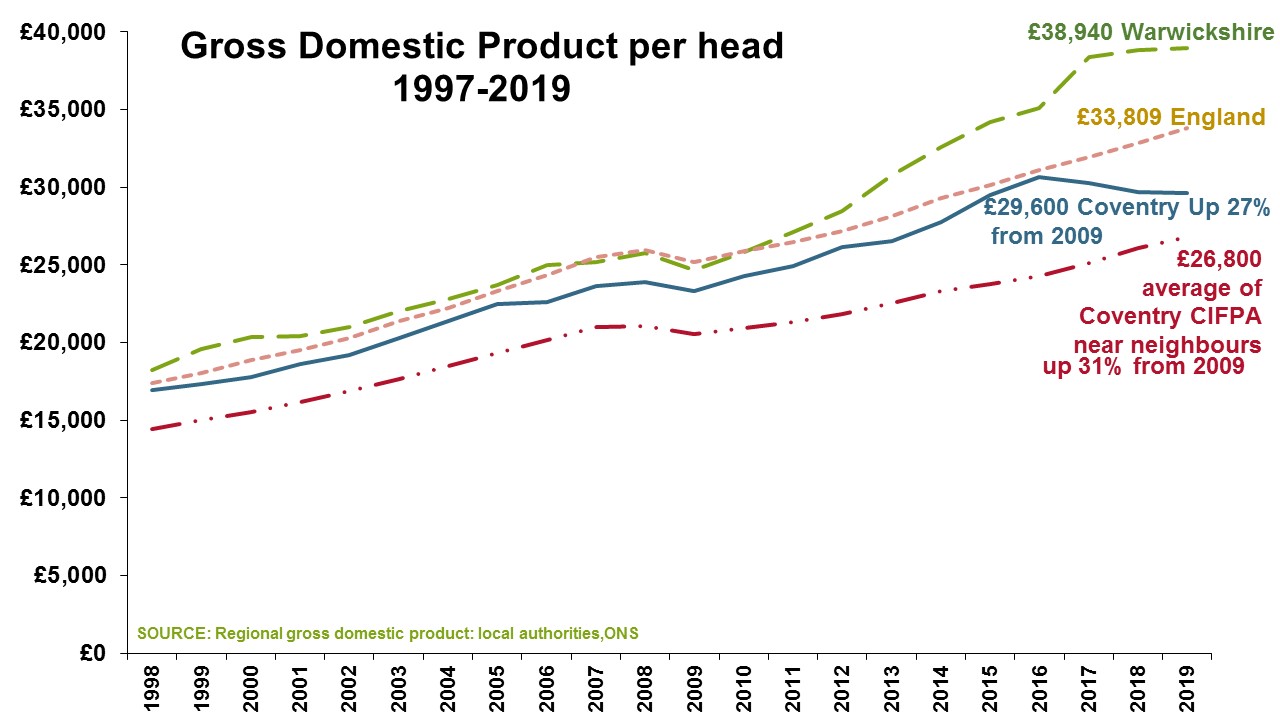Supporting businesses to grow
A challenging economic outlook
The pandemic has had a strong, negative impact on the economic wellbeing and vitality of countries and cities around the world – and Coventry is likely to be no exception.
In the past thirty years, given its size, Coventry has performed below average. However, in the mid-2010s growth in a number of internationally significant business sectors in the region including advanced manufacturing and engineering; energy and low carbon; connected autonomous vehicles; business, professional & financial services; and digital, creative, and gaming have created good jobs for local residents. Unfortunately, progress appears to have now stalled.
Coventry’s regional gross domestic product (GDP) per head stood at £29,608 in 2019, down from £29,681 in 2018. This new figure, replacing the previous gross value added (GVA) figure, considers the effect of taxation including VAT, and subsidies; but, the latest figure, for 2019, obviously does not consider the effect of the pandemic. Coventry fares better than the West Midlands figure of £27,574 but perform worse than the England average of £33,809.
In 2019, Coventry’s total GDP grew by 1.0%, but the total population of the city grew faster meaning that GDP per head actually fell (-0.2%). This compares unfavourably to the overall England annual growth in GDP per head in 2019 of 3.0% and the average growth amongst similar places to Coventry (CIPFA nearest neighbours) of 2.7%.
Note that ONS estimates suggest that Coventry has been one of the fastest growing population centres outside of London in recent years, so the reduction could be partly a side-effect of the growth of the local universities – many students are economically inactive, even though they contribute in other ways to the life and vitality of the city’s economy.
Supporting businesses through difficult times
The Council has gone to great lengths to support businesses during the coronavirus pandemic. Restrictions imposed on society to help reduce the spread of the virus has meant many businesses have had to close and many of those that stayed open have suffered significantly reduced trade.
To support those businesses, the Council’s economic development service has:
• awarded over £18.5m in direct cash grants to more than 1,500 businesses that were forced to close in Coventry; and
• awarded over £13.4m in discretionary cash grants to over 2,000 businesses in Coventry.
Discretionary grants have also been disbursed in more creative ways:
• a new one-to-one business support programme, run in conjunction with the Chamber of Commerce;
• supporting the Coventry Business Improvement District (BID) to help increase footfall;
• bespoke support for market traders who might have otherwise missed out on grants; and
• specific support for nightclubs that have remained closed since the start of the first national lockdown.
Alongside the large-scale Covid-19 response to support businesses in need, the service has also continued to run the three European Regional Development Fund (ERDF) business support programmes, with many switching to a digital format to provide remote support via video conference, alongside a popular series of online webinars. These programmes secured a further £8.12m this year to extend them to June 2023. This financial year the three programmes combined have paid out grants of £1.45m to 108 companies. When taking matched funding into account, this represents a total investment of £5,052,331 to the Coventry and Warwickshire economy. Overall, when non-financial support is included, the three programmes have supported 264 businesses and created 117 new jobs.
Less business rates collected
Business rates total rateable value reduced to £317m in 2020/21 from £319m in 2019/20. The total rateable value of Coventry businesses has been relatively stable for several years and in overall terms the movement observed represents a variation of only 1%. There are multiple events and trends that can affect this figure including the overall health of the local economy and trends within different sectors including those which may not have a need for a traditional property base. At present, it is difficult to assess the impact that the Covid-19 pandemic has had on business rates, as much of the full impact on businesses has been cushioned by measures taken nationally to ‘freeze’ the economy; and it could be some time before any medium-term trends are clear.
What is clear, however, is that the pandemic, and associated restrictions and economic impact have resulted in a significant reduction in business rates in-year revenue. 91.3% of collectable business rates were collected in-year, a reduction from 98.0% in 2019/20. This is below the target in-year collection rate of 98%.



